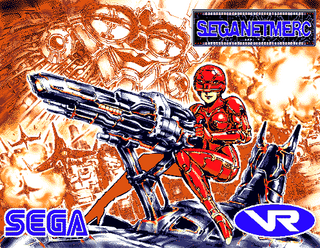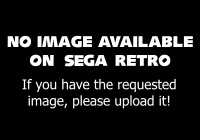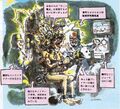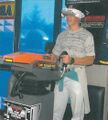Difference between revisions of "Dennou Senki Net Merc"
From Sega Retro
Hyperspeed34 (talk | contribs) |
Hyperspeed34 (talk | contribs) |
||
| Line 1: | Line 1: | ||
{{Bob | {{Bob | ||
| bobscreen=DennouSenkiNetMerc Title.png | | bobscreen=DennouSenkiNetMerc Title.png | ||
| − | | publisher=[[Sega]] | + | | publisher=[[Sega Enterprises, Ltd.]] |
| developer=[[Sega AM3]],{{fileref|Sega Arcade History JP EnterBrain Book-1.pdf|page=136}} [[Virtuality]] | | developer=[[Sega AM3]],{{fileref|Sega Arcade History JP EnterBrain Book-1.pdf|page=136}} [[Virtuality]] | ||
| system=[[Sega Net Merc]], [[Model 1]] | | system=[[Sega Net Merc]], [[Model 1]] | ||
| Line 10: | Line 10: | ||
}} | }} | ||
}} | }} | ||
| − | '''''{{PAGENAME}}''''' (電脳戦記ネットマーク, Cyber Troopers '''Net'''work '''Merc'''enary) is an [[arcade]] game developed by [[AM3]] with assistance from [[Virtuality]].{{magref|gamemachinejp|455|1}} One of several attempts made at [[virtual reality]] by | + | '''''{{PAGENAME}}''''' (電脳戦記ネットマーク, Cyber Troopers '''Net'''work '''Merc'''enary) is an [[arcade]] game developed by [[AM3]] with assistance from [[Virtuality]].{{magref|gamemachinejp|455|1}} One of several attempts made at [[virtual reality]] by Sega, it is the only game created for the [[Sega Net Merc]] system (a specialized arcade cabinet using [[Model 1]] boards with the [[Mega Visor Display]] headset to produce [[virtual reality]] visuals), so the two are often used interchangeably. If considered to be a Model 1 game, it is the final release for the system. |
As a result of criticism, lack of new Model 1 board stock, and numerous delays since the initial agreement between Virtuality and Sega in June 1993, ''Dennou Senki Net Merc'' received a very limited release, with few units appearing outside Japan.{{ref|1=https://web.archive.org/web/20210607083239/http://www.system16.com/hardware.php?id=712}} It has remained an obscure and rare footnote. | As a result of criticism, lack of new Model 1 board stock, and numerous delays since the initial agreement between Virtuality and Sega in June 1993, ''Dennou Senki Net Merc'' received a very limited release, with few units appearing outside Japan.{{ref|1=https://web.archive.org/web/20210607083239/http://www.system16.com/hardware.php?id=712}} It has remained an obscure and rare footnote. | ||
Latest revision as of 02:37, 5 November 2024
| Dennou Senki Net Merc | |||||||||
|---|---|---|---|---|---|---|---|---|---|
| System(s): Sega Net Merc, Model 1 | |||||||||
| Publisher: Sega Enterprises, Ltd. | |||||||||
| Developer: Sega AM3,[1] Virtuality | |||||||||
| Genre: Shoot-'em-up | |||||||||
| Number of players: 1 | |||||||||
|
Dennou Senki Net Merc (電脳戦記ネットマーク, Cyber Troopers Network Mercenary) is an arcade game developed by AM3 with assistance from Virtuality.[2] One of several attempts made at virtual reality by Sega, it is the only game created for the Sega Net Merc system (a specialized arcade cabinet using Model 1 boards with the Mega Visor Display headset to produce virtual reality visuals), so the two are often used interchangeably. If considered to be a Model 1 game, it is the final release for the system.
As a result of criticism, lack of new Model 1 board stock, and numerous delays since the initial agreement between Virtuality and Sega in June 1993, Dennou Senki Net Merc received a very limited release, with few units appearing outside Japan.[3] It has remained an obscure and rare footnote.
Contents
Gameplay
Dennou Senki Net Merc is an on-rails first person shoot-'em-up, in which players use a large gun controller to fire at enemies. Also being a virtual reality game, players are also given a VR headset (a "MVD" or "Mega Visor Display"[4], used previously by the VR-1 theme park attraction), allowing for their head movements to be tracked in real time and therefore see a full 360 degree view of their various in-game surroundings.
The game itself is a straightforward arcade shooter; no set time limit is provided, however a depletable health bar is used to curb time. Players are always stood facing in one direction behind the gun controller during gameplay. The complex nature of the system means that a member of staff is usually on hand to assist users with the headset. Gameplay is also outputted for onlooking bystanders onto a monitor attached to the play field.
Levels
Dennou Senki Net Merc takes place in four levels; though the start and end stages remain the same on any run, the middle two stages can be selected interchangeably.[5]
| Desert Stage | |
|---|---|
| The game begins with a desert practise level. In it, enemies and obstacles such as combat vehicles, mechs, war bases, and explosible barrels only appear in front of the player. Once it is completed, a choice of two different level routes is given through a warp station; in both of these, the difficulty increases, with enemies now appearing from all sides, requiring the player to look around and take greater advantage of the VR technology. | |
| CPU Stage | |
| The upper route given to players after the first level is held inside a large computer. In it, the player is transported into a CPU corrupted by a virus that has manifested itself physically in the form of the stage's enemies. They are tasked with ending the corruption by destroying these, as well as an end of level boss, with vaccines. | |
| City Stage | |
| The lower selectable route once the practise level has been completed transports the player to an urban city landscape in mid-day. Combat vehicles and soldier robots below the player on the city streets can be destroyed, as well as a number of hovering enemies and an end of level mecharoid boss. | |
| Final Stage | |
| Accessed through a ground warp in the previous selected level, the final part of the game takes place in a spherical space station inhabited by numerous larger enemies. If successfully completed, a third person run-through of how each level was played is given to the player before the game concludes. |
History
Development
- Main article: Dennou Senki Net Merc/Development.
Release
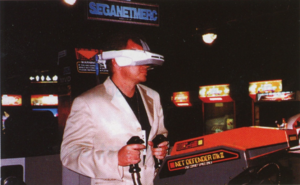
Despite its negative reception at AOU Show 1995 and several delays, Dennou Senki Net Merc was ultimately kept on Sega's release schedules for May.[1] It is suggested by main programmer Andy Reece that this was due to a successful location test at Ikebukuro GiGO in the preceding months, whereupon the game apparently outperformed Daytona USA on its original trial weekend.[3] However, a shortage of Model 1 hardware also said to have affected other later releases meant that very few units could be made and sold to arcades - despite Sega's initial intent to ship 2,000 VR units as part of their partnership with Virtuality,[6] retrospective estimates of total Net Merc machines manufactured range from less than 20[7] to 70.[3]
Dennou Senki Net Merc appears to have been most frequently installed in Sega's own amusement facilities; at least 10 had received it by August 1995,[8] including O2 Park Sega World, Shinsaibashi GiGO, and Osaka ATC Galbo.[9] Very few units are thought to have been exported outside of Japan, however it is known to have reached Metropolis,[10] SegaWorld London,[11] and Sega Park Madrid;[12] others were supposedly planned to appear in Sega World Bournemouth and Sega VirtuaLand.[13] Net Merc units were also found in Korea[14] and New Zealand in the late 1990s and early 2000s.[15][4]
Legacy
Despite using the critically-acclaimed Mega Visor Display headset, Dennou Senki Net Merc is retrospectively not considered to have been as influential as Virtuality's other works, remaining an obscure rarity as a result of its low production run and resultant lack of popularity. Most installations likely were removed by the early 2000s, and no further games are known to have been developed for the Net Merc system after the release of Dennou Senki Net Merc.
Design motifs associated with it and the MVD would eventually live on in the AM3-developed Cyber Troopers Virtual-On, in which the headset was incorporated into the Virtuaroid mechs.[16] Rumours also circulate which suggest that Cyber Troopers was originally intended to be a release for the Net Merc system.[17]
Magazine articles
- Main article: Dennou Senki Net Merc/Magazine articles.
Promotional material
- Main article: Dennou Senki Net Merc/Promotional material.
Videos
- Video excerpt showing Dennou Senki Net Merc running on the Flight Deck floor of SegaWorld London, taken from season three, episode #7 ("A Special Place", 1997) of BBC documentary series Connections
- Video excerpt showing Dennou Senki Net Merc running on the Flight Deck floor of SegaWorld London, taken from scene shot in Piccadilly Circus from 1998 Italian comedy film Cucciolo
Artwork
Promotional artwork (specifically colored for Saturn Fan coverage[18])
Photo gallery
Tecwar cabinet, Amusement Machine Show 1994[19]
Korean installation, unknown location, circa 2003[14]
Kijima Kogen Park, circa late 1990s[20]
Osaka ATC Galbo, circa 1998
Technical information
Archival status
As a result of its low production run and poor reception, very few boards for Dennou Senki Net Merc are known to currently exist. It is believed only two remain with incomplete/faulty Sega Net Merc systems; one is held by arcade collector Eric "ShouTime" Chung,[21][22] while another was acquired and recorded for the "SEGA MODEL KING" YouTube channel, making it the first known footage of the game recorded off of original Model 1 hardware.[23]
Dennou Senki Net Merc was dumped by ShouTime during 2014, however it remains the only Model 1 game to have compatibility and playability issues when ran conventionally in MAME due to its virtual reality visuals and hardware discrepancies. A workaround can be purportedly attempted by reconfiguring the game's dip switches, though if not done properly causes serious graphical issues and is not possible with some versions of the emulator.[23]
ROM dump status
| System | Hash | Size | Build Date | Source | Comments | |||||||||
|---|---|---|---|---|---|---|---|---|---|---|---|---|---|---|
| ? |
|
6.91MB | Dennou Senki Net Merc |
External links
References
- ↑ 1.0 1.1 1.2 Sega Arcade History, Enterbrain, page 136
- ↑ Game Machine, "1993-08-15" (JP; 1993-08-15), page 1
- ↑ 3.0 3.1 3.2 http://www.system16.com/hardware.php?id=712 (Wayback Machine: 2021-06-07 08:32)
- ↑ 4.0 4.1 File:Becoming Virtual - Bodies, Technologies, Worlds (Thesis by Nicola Green, University of Canterbury, New Zealand, 1999).pdf, page 183
- ↑ Saturn Fan, "1995 August" (JP; 1995-07-07), page 94
- ↑ Game Machine, "1993-03-15" (JP; 1993-03-15), page 14
- ↑ https://www.bluegartr.com/threads/119249-Sega-NetMerc (Wayback Machine: 2021-07-05 20:58)
- ↑ Saturn Fan, "1995 September" (JP; 1995-08-08), page 97
- ↑ https://netanker.hatenablog.jp/entry/19980529/p3 (Wayback Machine: 2021-04-10 01:43)
- ↑ Computer & Video Games, "November 1995" (UK; 1995-10-13), page 75
- ↑ File:Escape SegaWorldLondon Incomplete.mp4
- ↑ File:UltimaGeneracion ES 09.pdf, page 33
- ↑ Mega Power, "August 1993" (UK; 1993-07-29), page 8
- ↑ 14.0 14.1 @from2001vr on Twitter (Wayback Machine: 2021-06-17 01:41)
- ↑ File:Becoming Virtual - Bodies, Technologies, Worlds (Thesis by Nicola Green, University of Canterbury, New Zealand, 1999).pdf, page 75
- ↑ https://www.gamebusiness.jp/article/2016/09/14/12597.html (Wayback Machine: 2016-10-04 20:00)
- ↑ @ohfivepro on Twitter (Wayback Machine: 2021-01-12 21:03)
- ↑ Saturn Fan, "1995 August" (JP; 1995-07-07), page 87
- ↑ @oritech on Twitter (Wayback Machine: 2021-10-15 00:04)
- ↑ @mukasiya_game on Twitter (Wayback Machine: 2021-03-11 15:40)
- ↑ https://www.nintendolife.com/news/2016/06/ninterview_preserving_gaming_history_with_arcade_collector_shoutime (Wayback Machine: 2021-01-17 10:22)
- ↑ https://forums.arcade-museum.com/threads/sega-netmerc.295556/ (Wayback Machine: 2021-07-05 20:48)
- ↑ 23.0 23.1 https://www.youtube.com/watch?v=E3Cg40ZmWpQ
- ↑ https://wowroms.com/en/roms/mame/sega-netmerc/96941.html (Wayback Machine: 2022-07-18 00:48)
| Mega Visor Display | |
|---|---|
| Hardware | Mega Visor Display | VR-1 | Sega Net Merc |
| Software | Space Mission | Planet Adventure | Dennou Senki Net Merc |
